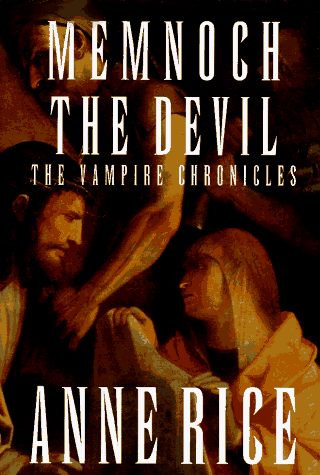
Today's review will regain my blog's former normalcy with regards to the format of the review. Being as Anne Rice's novels are packed with complex metaphors, symbolism, and philosophical questions. Trying to describe this complexity in an overcomplicated format would not serve the novel in review justice.
Memnoch the Devil
Written in the first person perspective of the wily, impulsive Lestat; Memnoch the Devil begins already with the promise of a richly layered account of heaven and hell. Countless Amazon reviews have expressed negative comments about Memnoch the Devil for the last decade. These reviews are to be expected, considering the inherent controversial nature of any theological study. Even more troublesome to some readers is the fact this theological narrative is written by a vampire. Personally, I fully respect Anne Rice for her choice of Lestat as the witness to the metaphysical because his scrutiny of new discoveries partially reflects our subconscious denial of sights beyond explanation.
The novel itself begins with the usual appearance of Lestat, stalking potential vampire prey. Though this particular suspect has a criminal profile and his story constructs the base for the story to build upon. Anne Rice wisely utilizes this familiar story to comfortably ease us into the later disoriented account of the metaphysical. In varying ways, this beginning story magnifies Lestat's increasing feelings of remorse and guilt over the murder of these victims. On one hand, he knows fully of the beneficial effects of satiating his blood lust. It works to enliven him and help him to gain more lucidity in thought. In another way though he knows he could exist without this blood and tolerate the unceasing pangs of his blood thirst.
Without revealing too many details surrounding the novel, Lestat soon ventures into the realms of heaven and hell. This entire journey involves being guided by Satan himself. Using her meticulously written prose, we are fully immersed in Lestat's journey of doubts, questions, wonderment, and feelings of sympathy towards highly abhorrent figures such as Satan. Though, Anne Rice expertly writes Satan as a fully realized character with many dimensions. Instead of the demonic caricature, we are offered a character to whom we can easily sympathize with or distrust completely. Additionally, Anne Rice never coaches or instructs us on who we should ultimately ally with. Her reasons for this lies with the fact we are only seeing Lestat's analysis of the given situation. Through his views, we can understand the overwhelming amount of contradictions and views involved with the affairs of God and Satan.
In my view, the reason this novel deserves more academic attention because of the fresh perspective of theology offered in this book. Anne Rice wrote a novel that's far too complicated to fully interpret and understand. Even when I'm writing this review, I feel completely overtaxed with the task of simplifying the wealth of information contained in this novel. With her visuals and accessible writing, this potentially boring theological study becomes very fascinating and challenging. After reading this novel, I've been poring over various religious texts and other documents to try and understand the origins behind some of these very innovative and unconventional ideas behind God's nature.
Ultimately though, I feel some kinship with Lestat in the submission that we cannot understand every shred of information. In the end, we must accept our shortcomings and limitations as humans in terms of understanding the breadth of God's knowledge. The search for knowledge reflects the deep longing for all humans for their sufferings to be redeemed. Without that search or need for transcendence, there would be no force impelling us to improve us fallen selves or to live beyond our bodies. Accepting these facts helps transform the superficial believer into someone whom sees beyond mortal limits. Without arrogance in response to the metaphysical, we are convinced to love others and to promote their personal evolution. Too often, books with Christianity are simplified and bowdlerized thereby distorting God's message into something that offers temporal satiation. Except faith without the unceasing need for knowledge, transformation, and edification becomes feigned faith. How can we search for the exit from Plato's cave without the overwhelming need for the promised salvation that awaits outside? Good series, like the Vampire Chronicles, effectively affirm this search and confirm our inability to fully understand God's truths on this physical plane.
Thank you, Anne Rice for continuing to be write bravely stories that are bound to misunderstood and construed by the differing perspectives of people!! Your novels are wonderful books that are transformative and emotive. With your Jesus books, I have come to a greater understanding of Christianity that was formerly denied to me. I implore you to keep writing even when the scathing words of many confused individuals dissuade you from it. In the world of the inquisitive and curious, you are greatly appreciated!
For any one interested in exploring Anne Rice's literary world, check out her site. On there, she's posted an essay that agrees with my views regarding the Christian subtext of her work. Also, for any Facebook members, she openly discusses many thought provoking subjects in an honest fashion on her Facebook fan page. She happens to be one of the few genuine individuals whose thought patterns do not conform to any ideas from the dominant culture. As evidenced in her writing, she's an autonomous thinker.










No comments:
Post a Comment